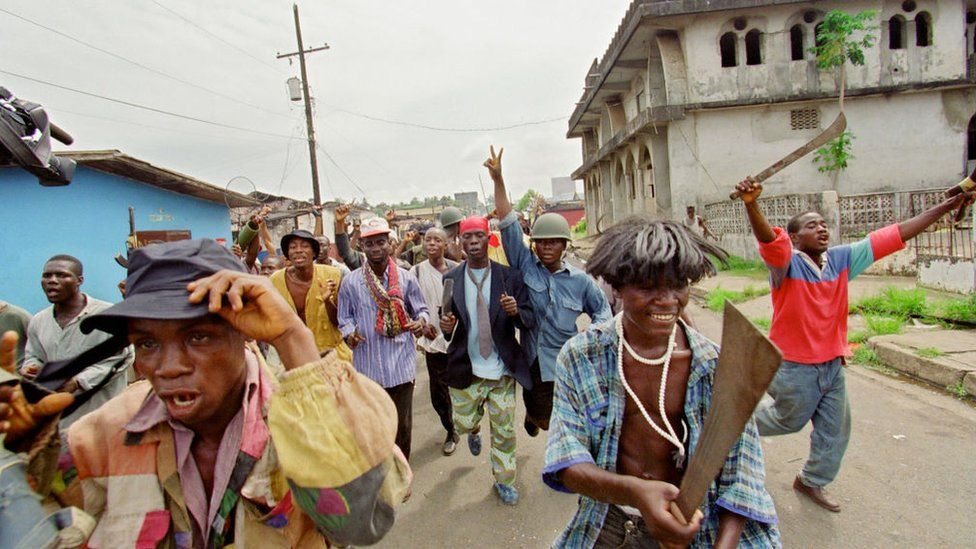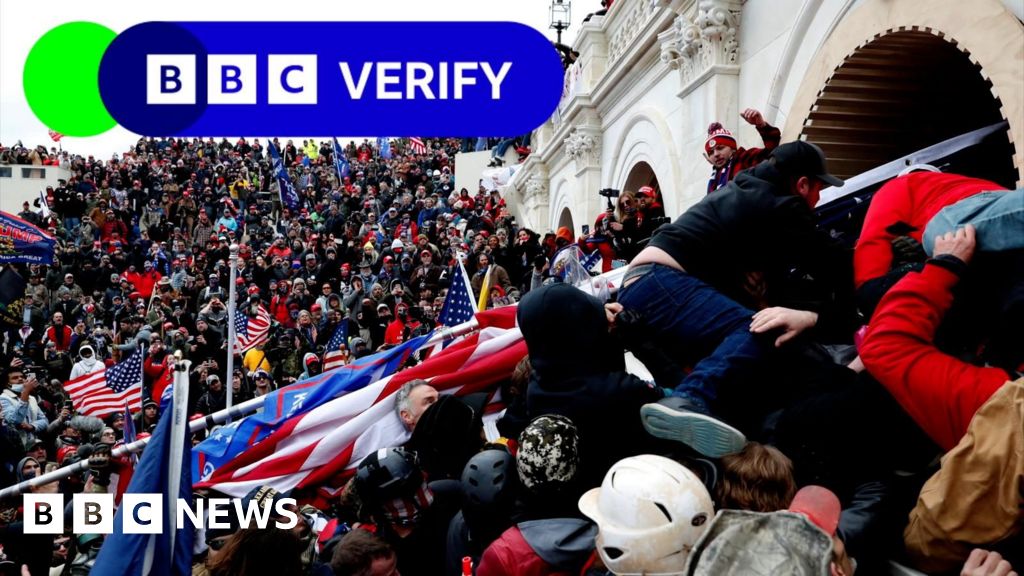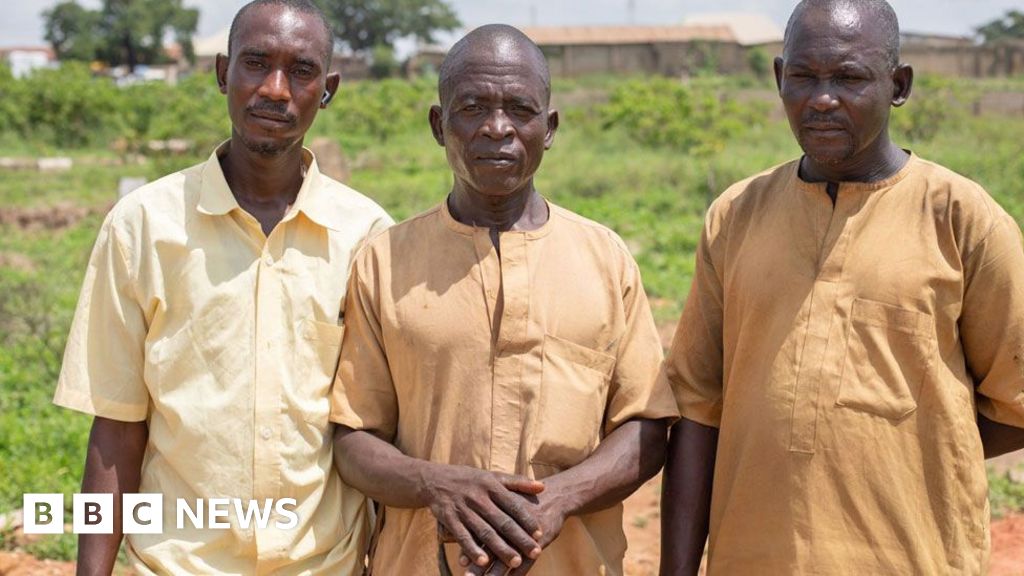ARTICLE AD BOX
By Robin Levinson-King
BBC News
 Image source, CHRISTOPHE SIMON
Image source, CHRISTOPHE SIMON
Militiamen of Charles Taylor's National Patriotic Front of Liberia cheering in the streets.
Bill Horace, an accused Liberian warlord who fled to Canada, was shot to death in 2020. Now, his alleged killer will appear in court. Can justice ever be truly served?
It was the early hours before dawn when Bill Horace and his wife Joyce awoke to the sound of breaking glass.
They had been sleeping in their pink split-level home in London, Ontario, which they shared with their children Royce and Kobe, ages 9 and 4, when four armed men broke through the basement window.
A struggle ensued, and shots were fired, with several bullets hitting Horace, who dragged himself outside to seek help. The men ran away after taking C$20,000 ($15,300; £13,000) in cash.
He died later in hospital.
News of the shooting - in a town of 400,000, about two hours from Toronto - made headlines, not just because of the violent nature of the attack but because of the identity of the victim. Bill Horace was an accused warlord in his home country of Liberia.
Although he was never charged with war crimes in Liberia or Canada, several people have identified him as a commander in former Liberian president Charles Taylor's army.
Taylor was convicted of crimes against humanity in the neighbouring country of Sierra Leone and is serving a 50-year sentence.
At first, many wondered if the shooting had been retaliation for Horace's alleged past sins.
Instead, police believe that Horace had become embroiled with criminals in his adopted country, and that he died as a result of his entanglement with a network of fraudsters.
They have charged Keiron Gregory, 23, with second-degree murder. The other three accused remain at large and have not been publicly identified.
Image source, London Police Service
Image caption,Keiron Gregory will appear in court on 18 July
Although it remains unknown exactly if Keiron knew Horace, records show both men have a controversial past.
Keiron is the son of a veteran Toronto police officer, and investigators claim he got his father Trevor Gregory to use his police connections to look up Horace's address after Horace allegedly took money from him.
Trevor Gregory pleaded guilty to breaching public trust in April. Keiron will next be in court on 18 July, when he is expected to enter a plea.
Massa Washington, a veteran journalist who served as a commissioner on Liberia's Truth and Reconciliation Commission, told BBC Focus on Africa that Mr Horace was one of the most "notorious" of Taylor's generals.
As a commissioner, she heard testimony from victims of human rights abuse during her country's brutal civil wars.
"He was alleged to have committed some of the most atrocious crimes that you could imagine - murder whole families, shot people to death, behead people," she said. "His men were involved in the rape of women, opening of pregnant women's stomachs."
Little is known about Horace's childhood - he was born around 1971, and fled his hometown of Buchanan in 1990 when the National Patriotic Front of Liberia (NPFL), a rebel group led by Taylor, advanced on the area, according to reporting from Rodney Sieh for Front Page Africa Online.
Although it's unclear when he joined the NPFL, an extensive profile by Canadian magazine Maclean's said that in 1993, Horace commanded a group of NPFL soldiers and took part in a massacre.
"They came and accused us of looting and therefore said we should be executed," John Harmon told Maclean's in 2010. "Twenty-one were executed in all fashions. They were shot. They were beheaded. Some were nailed to the cross, like my brother, Steve. He was nailed to the cross and then later shot."
Ms Washington said Horace was named in the Liberia's Truth and Reconciliation Commission's final report and it was recommended that he face prosecution - but he was never charged. To date, no-one has ever been convicted in Liberia of war crimes committed in that country.
In 2002, Horace moved across the ocean to Canada, where he applied for refugee status.
That status was eventually denied, but he remained in the country, appealing his removal several times. In 2009, he applied for permanent resident status, but at the time of his death, he was not a permanent resident, according to Maclean's.
In the 2010s, the Canadian Centre for International Justice (CCJI) tried to get the government to bring war crimes charges against Horace.
Matt Eisenbrandt, who was legal director of the CCIJ at the time of its investigation, told the BBC he gave Canadian police "a mountain of evidence on a silver platter", including the testimony of over a dozen witnesses who described "horrific" crimes allegedly committed by Horace and his soldiers.
But the government never brought criminal charges, pursuing an immigration case instead.
Geneviève Groulx, a spokesperson for Canada's justice department, said it does not comment on the existence of war crimes investigations unless charges are brought, in order to preserve the "integrity" of the process and the privacy of those involved. Citizenship and Immigration Canada also declined to comment.
If the horrors of Horace's past followed him across the sea, they mostly remained in the shadows. He had five children in Canada, including two with his wife Joyce, whom he married in 2010. He also has two daughters that live in Sweden.
A lawsuit has been filed on behalf of her and his family against the Toronto Police Services Board, former police chief Mark Saunders, Trevor Gregory, Keiron Gregory, and three unidentified assailants in his attack.
In the statement of claim, obtained by the BBC, the lawsuit describes the Horaces as "a close-knit family who spent every weekend together", and Horace himself as a loving father and devoted husband, who cooked for his children, took them on family vacations and to sports activities.
The lawsuit, which was filed in 2020, is asking for C$775,000 in damages due to the emotional and financial loss of Horace as a breadwinner. The suit alleges that TPSB and the former police chief are responsible for the actions of the elder Trevor Gregory. Lawyers on behalf of TPSB, Mr Saunders and Trevor Gregory filed a statement of intent to defend.
Image source, Randy Risling
Image caption,Former Toronto police chief Mark Saunders is named in Horace's family's lawsuit
Charges against police officer Trevor Gregory reveal what police say happened the days and hours before Horace was killed.
Just after midnight on 21 June 2020, the prosecution say Trevor got a text from his son Keiron, saying that he had been defrauded out of a large sum of money and that he had the licence plate of the man who had done it.
Shortly after, Trevor texted his police connections "strange car creeping through my hood… could you run this for me", the charges say.
After a colleague provided him with the address, Trevor wrote the information down on a piece of paper and invited his son over to his home. He stepped out of the room while his son took a photo of the information, the prosecution allege. Trevor will be sentenced in August.
He is currently suspended with pay from the police force, and is facing professional misconduct charges.
While it's unclear how Horace had crossed paths with Keiron, both men are alleged to have been involved in crime in south-western Ontario.
Horace's immigration documents say he earned a living through importing and exporting farm equipment, but in 2013, he was charged with theft under $5,000, fraud and making counterfeit money.
The fraud and counterfeit charges were dropped, and he was found guilty of theft under $5,000 and sentenced to 12 months probation in 2016, according to the Toronto Star.
Meanwhile, the police officer's son had racked up a dozen charges, but no convictions, since 2016.
While Keiron and his father have been called to court for their alleged roles in Horace's death, those familiar with Horace's past are upset he escaped justice.
Canada missed an opportunity to provide some justice for survivors in Liberia, Mr Eisenbrandt said. "Instead, his own violent demise was a damning indictment of the government's failures in this case."
And Ms Washington said: "I don't think is a very good news for Liberians, especially his victims, because justice has not been served in this case."
"He's dead and gone. He's not going to face the war crimes court, he's not going to be able to account on this earth for the wickedness."

 2 years ago
78
2 years ago
78








 English (US) ·
English (US) ·